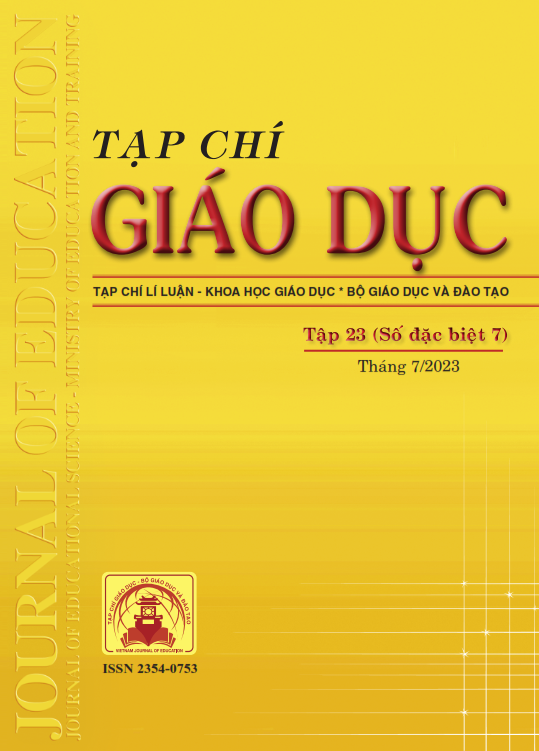Tích hợp giáo dục phát triển bền vững trong dạy học hóa học theo hướng STEM thông qua chủ đề "Tái chế giấy"
Tóm tắt
Education for Sustainable Development (ESD) is a framework that promotes the integration of environmental, social, and economic dimensions of sustainability into teaching and learning practices. The integration of ESD into STEM-themed teaching will provide students with opportunities to address sustainable development and social scientific issues that are relevant to them, locally or globally. The article presents principles and orientations for integrating ESD through STEM topics in Chemistry. On this premise, the STEM topic “Paper recycling” of Grade 12 Organic Chemistry content is analyzed and clarified. The results of pedagogical experiments on 44 students show that this integration has a positive impact on students' awareness and attitudes about sustainable development and also increases their collaboration and enthusiasm for learning. Some recommendations on time length and methodologies in learning activity arrangement are also suggested from the empirical data.
Tài liệu tham khảo
Aikenhead, G. (1994). “What is STSE science teaching?”, in Solomon, J. and Aikenhead, G. (eds.) STS education: international perspectives on reform. New York and London: Teachers College Columbia University, pp. 47-59.
Bộ GD-ĐT (2018). Chương trình giáo dục phổ thông - Chương trình tổng thể (ban hành kèm Thông tư số 32/2018/TT-BGDĐT ngày 26/12/2018 của Bộ trưởng Bộ GD-ĐT).
Burmeister, M., Rauch F., & Eilks I. (2012). Education for sustainable development (ESD) and secondary chemistry education. Chemistry Education Research and Practice Journal, 13, 59-68.
Bùi Hiền, Nguyễn Văn Giao (2001). Từ điển Giáo dục học. NXB Từ điển Bách khoa.
Chen, C., An, Q., Zheng, & L.Guan, C. (2022). Sustainability Literacy: Assessment of Knowingness, Attitude and Behavior Regarding Sustainable Development among Students in China. Sustainability, 14, 4886. https://doi.org/10.3390/su14094886
De Haan, G. (2006). The BLK “21” programme in Germany: a ‘Gestaltungskompetenz’-based model for education for sustainable development. Environmental Education Research, 12, 19-32.
Đinh Thị Xuân Thảo, Cao Thị Thặng, Lê Thị Hồng Hải, Trần Thị Yến Vy (2018). Thiết kế tiến trình dạy học chủ đề tích hợp “Pin điện hoá sáng tạo” theo định hướng giáo dục STEM. Tạp chí Khoa học, Trường Đại học Sư phạm Hà Nội, 63(10), 167-181. http://doi.org/10.18173/2354-1075.2018-0161
Đoàn Thị Thanh Phương (2020). Vận dụng các phương pháp và kĩ thuật dạy học tích cực để tổ chức dạy học tích hợp giáo dục phát triển bền vững trong môn Địa lí 10 ở trường trung học phổ thông. Tạp chí Khoa học, Trường Đại học Sư phạm Hà Nội, 65(4), 39-47. http://doi.org/10.18173/2354-1075.2020-0055
Đỗ Hương Trà, Nguyễn Diệu Linh (2021). Bồi dưỡng năng lực giải quyết vấn đề thực tiễn qua tổ chức các hoạt động trải nghiệm gắn với giáo dục phát triển bền vững trong dạy học vật lí. Tạp chí Khoa học, Trường Đại học Sư phạm Hà Nội, 66(2), 174-185. http://doi.org/10.18173/2354-1075.2021-0032
Đỗ Thị Thanh Thư, Phạm Thị Bích Đào (2021). Phát triển năng lực vận dụng kiến thức kĩ năng cho học sinh trung học phổ thông qua dạy học chủ đề STEM tích hợp nội dung giáo dục bảo vệ môi trường trong môn Hoá học. Tạp chí Khoa học, Trường Đại học Sư phạm Hà Nội, 66(4E), 271-282. http://doi.org: 10.18173/2354-1075.2021-0207
Maidou, A., Plakitsi, K. & Polatoglou, H. (2019). Knowledge, Perceptions and Attitudes on Education for Sustainable Development of Pre-Service Early Childhood Teachers in Greece. World Journal of Education, 9(5), 1-15. https://doi.org/10.5430/wje.v9n5p1
Nguyễn Tuấn Anh, Nguyễn Hữu Chung (2021). Dạy học tích hợp giáo dục môi trường phần Phi kim, Hoá học 9 ở trường trung học cơ sở. Tạp chí Khoa học giáo dục Việt Nam, 39, 25-30.
Rauch, F. (2004). Education for sustainability: A regulative idea and trigger for innovation, In W. Scott and S. Gough (eds.). Key issues in sustainable development and learning: A critical review (pp. 149-151), London: Roudlege Falmer.
Thủ tướng Chính phủ (2004). Quyết định số 153/2004/QĐ-TTG ngày 17/8/2004 về việc ban hành định hướng chiến lược phát triển bền vững ở Việt Nam (Chương trình nghị sự 21 của Việt Nam).
Trần Đức Tuấn (2008). Những điều kiện cơ bản để thực hiện thành công giáo dục vì sự phát triển bền vững ở Việt Nam. Tạp chí Khoa học, Trường Đại học Sư phạm Hà Nội, 53(3), 95-105.
UNCED (1992). Agenda 21. https://www.un.org/esa/dsd/agenda21/
UNESCO (2017). Education for Sustainable Development Goals: Learning Objectives. France.
UNESCO (2018). Integrating Education for Sustainable Development (ESD) in Teacher Education on South-East Asia. A Guide for Teacher Educators. Bangkok.
UNESCO, MGIEP (2017). Textbooks for Sustainable Development. A Guide to Embedding. Mahatma Gandhi Institute of Education for Peace and Sustainable Development. https://unesdoc.unesco.org/ark:/48223/
pf0000259932/PDF/259932eng.pdf.multi
Vương Thị Ngọc Loan, Trần Thị Gái, Kiều Thị Kính (2020). Quy trình tích hợp giáo dục phát triển bền vững thông qua hoạt động trải nghiệm trong học phần “Môi trường và Con người” ở bậc đại học. Tạp chí Giáo dục, 483, 50-54.
WCED (1987). Our Common Future. England.
Đã Xuất bản
Cách trích dẫn
Số
Chuyên mục
Giấy phép

Tác phẩm này được cấp phép theo Ghi nhận tác giả của Creative Commons Giấy phép quốc tế 4.0 .












